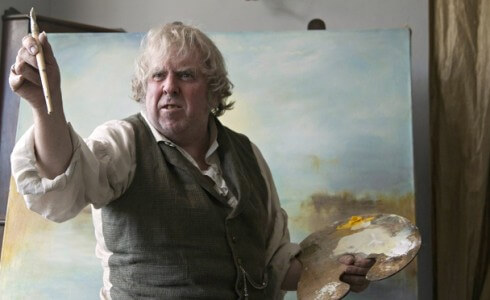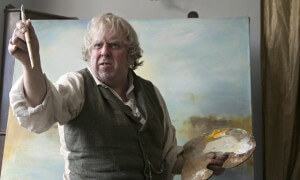Movie a Day Blog is unaware of any filmmaker who has ever worked in the style perfected by British writer-director Mike Leigh. He comes up with a concept, gathers a group of actors who improvise, brainstorm and build their characters and their story from the ground-up. Leigh then goes off and writes a script, the production financing is raised, and a Mike Leigh film results.
Leigh’s films are always interesting, some more successful than others, but it has been his forays in Britain’s colorful past that have been among his most revealing stories. The latest, and perhaps the best, is MR. TURNER (2014, Theatrical), a portrait of the brilliant if eccentric 19th century British painter J.M.W. Turner, famous for his glorious paintings of ships and sunsets.
Turner was a master in the use of light, as all great painters are (as well as great cinematographers), and MR. TURNER reveals part of his method: in-person intent study and sketching of landscapes and seascapes, looking for the essence in a setting or image. He even lashes himself to the mast of a boat in a storm to truly experience the rain and spray pouring from the grey-soaked skies.
Where MR. TURNER truly excels is in its portrait of the artist as a surly man. Brilliantly realized by Leigh veteran cast member Timothy Spall (who gained some fame playing Wormtail in the HARRY POTTER films), Turner is a many of many moods but few words. Most of what emerges from Spall’s mouth are grunts, snarls, groans and various sounds of disapproval, his primary mode of communication.
Yet somehow, Leigh and Spall are able to communicate what it means to be an artist: spitting on your work, painting a bright red daub on a beautiful art work just to spite another painter (in this case the famous John Constable), having animalistic sex with a quivering, willing and silent servant.
All these traits somehow add up to Turner’s genius, his ability to get inside of the light and paint his way out. Spall spent two years at Leigh’s insistence learning how to paint in various media, and it pays off.
Turner is not portrayed as a heroic character. He visits brothels, spurns a former wife (if that’s what she really was) and two daughters, and has little good to say about anyone, if he says anything at all. But could the man paint!
Leigh doesn’t burden us with those awful scenes of painters contemplating their thumb or some other artistic metaphor, but we are left with the solid impression of Turner the creator, the master who could take canvas and brush and make a sunset or sunrise come vividly alive.
The only real relationship Leigh and Spall allow poor lonely Turner is with his landlady in Margate, warmly portrayed by Marion Bailey. She could give a fig about Turner’s fame and reputation; she loves him for his plain homeliness and the magic that comes out of his mind and hands. She’s a touchstone for a man who seemed uncomfortable around both humanity and its individuals; only in Mrs. Booth’s arms can he safely become Mr. Booth, a middle class burgher who has nothing to do with the esteemed Mr. Turner.
Leigh, always the most subtle of directors, is virtually invisible here. We forget there is a vision propelling this story forward; it seems so much like Turner choosing to share some of his life with us. Leigh has reinvented modern naturalism; the world he creates of 19th century England is totally believable, as are the characters with whom he populates it.
Various other historical characters turn up, such as John Ruskin, who is portrayed as a rich fop, but the landscape belongs to Mr. Turner, and Spall owns it thoroughly. It’s one of the most lived-in performances of the year, and if the gods are just, he should receive an Academy Award nomination for Best Actor.
Turner wouldn’t have cared, and maybe Spall and Leigh don’t either, but as film viewers, we are all the richer for their journey into the past and an era where artists painted for themselves and their contemporaries, and not collectors and auction houses. By creating a rich work of art himself with MR. TURNER, Leigh has illuminated a larger canvas of the human imagination.



Comments are closed